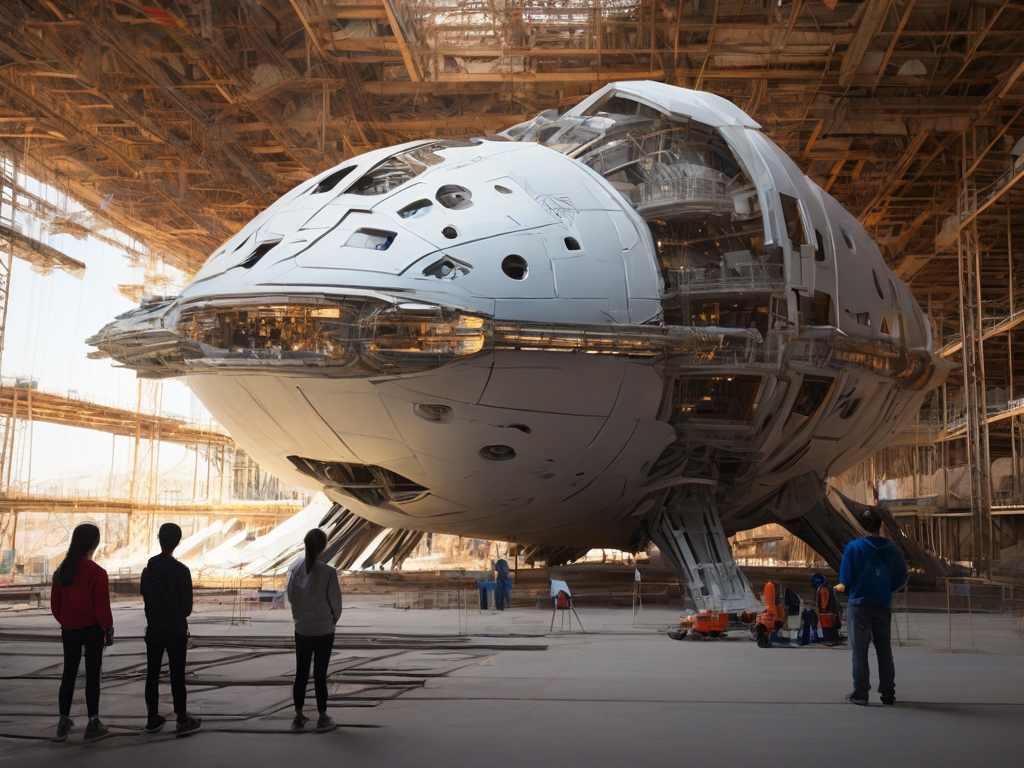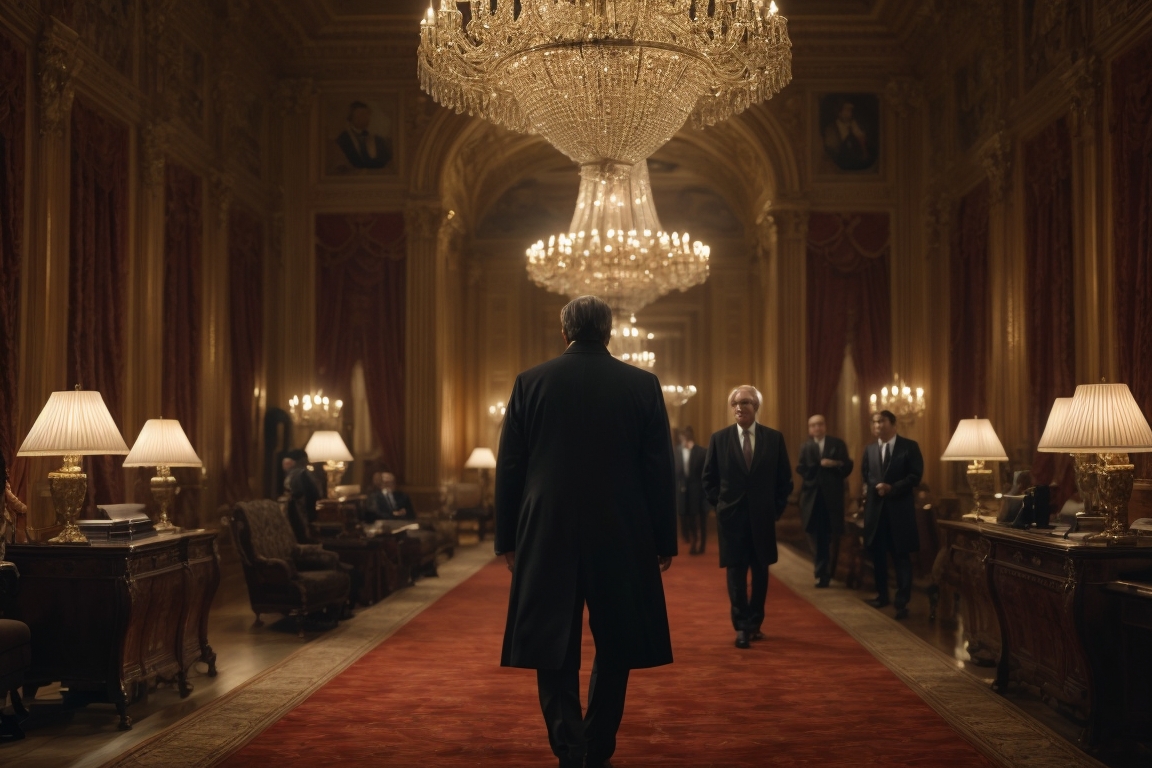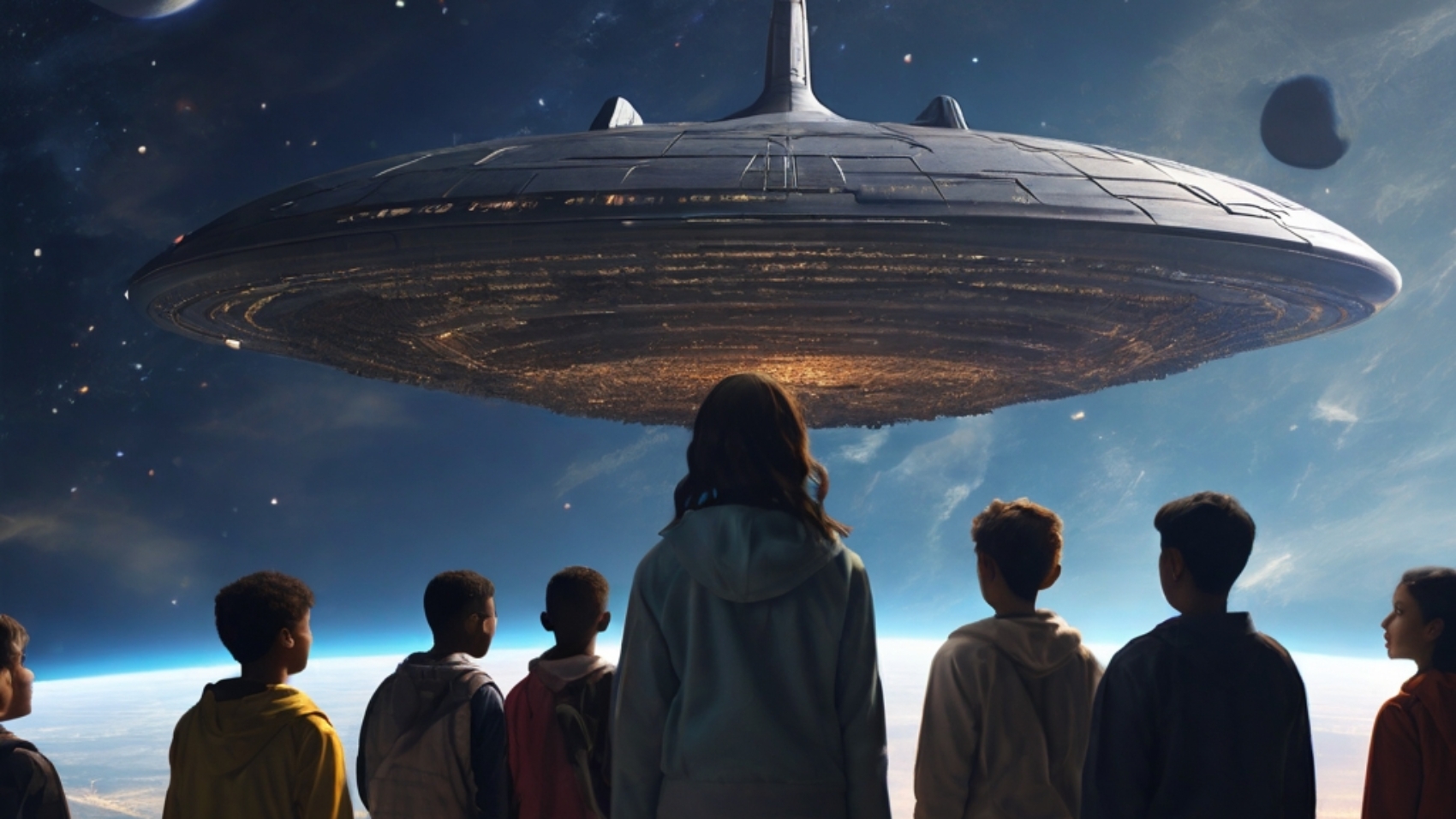“World in Ruin”
In the eerie shadows of a not-so-distant future, Europe, once a beacon of unity, grapples with the insidious machinations of Viktor Krasnov, a political puppeteer whose every move sends ripples through the geopolitical landscape. Unbeknownst to the world, Viktor’s children, Emma and Alex, find themselves unwittingly entangled in a web of power and survival, as the continent stands on the precipice of collapse.
Emma Krasnov, with her keen intellect and unyielding moral compass, often found solace on the balcony of their Brussels apartment. The sprawling city beneath her seemed to mirror the complexity of the political landscape her father manipulated. As Viktor charted his course through the intricate maze of European politics, Emma’s doubts grew, shrouding the family in an unspoken tension.
The Krasnovs’ dinner table, usually a space for familial warmth, became an arena for ideological clashes. Emma, with a furrowed brow, confronted her father, her voice carrying a mix of concern and accusation.
Emma: “Dad, what aren’t you telling us about your ascent in politics? The world is crumbling, and it feels like you’re at the very heart of it.”
Viktor, a master of political rhetoric, met Emma’s gaze with a measured response, his words crafted to veil his true intentions.
Viktor: “Emma, my dear, politics is a relentless game of chess. Sacrifices, however painful, are necessary for the greater good.”
Simultaneously, in the depths of the Krasnov residence, Alex, a technologically astute and inquisitive soul, delved into the world of encrypted files. His room, illuminated only by the glow of computer screens, became a sanctuary for exploration and discovery. As lines of code danced across monitors, an unsettling truth revealed itself to him.
Alex, muttering to himself, couldn’t shake the feeling that what he uncovered surpassed mere political intrigue.
Alex: “This goes beyond politics; there’s a grander scheme at play here. I need to unravel this web of secrets.”
“Space Project”
As the crisis escalated, Europe, teetering on the precipice of collapse, turned its desperate gaze toward the promise of salvation embodied in an audacious venture: the construction of an interstellar ark. The European Space Agency (ESA), once synonymous with exploration and scientific achievement, now found itself entangled in the complex web of political maneuvering and economic disparity.
Dr. Sofia Rodriguez, a visionary leader with the weight of humanity’s survival on her shoulders, stood at the helm of the ESA. The once-idealistic dream of exploring the cosmos had transformed into a high-stakes mission to secure a future for a select few. The corridors of the agency echoed with the urgency of construction and the muted whispers of those excluded from this celestial exodus.
Emma Krasnov, now a vocal critic of what she perceived as a morally compromised project, seized the opportunity to confront Dr. Rodriguez during a parliamentary hearing. The austere chamber, filled with the echo of dissenting voices, became the battleground for a clash of ideals.
Emma: “Why are we cherry-picking who gets to escape? This isn’t salvation; it’s elitism!”
Dr. Rodriguez, burdened by the weight of her decisions, met Emma’s gaze with a mixture of empathy and determination.
Dr. Rodriguez: “Emma, if we don’t make tough choices, there won’t be anyone left to save. The ark is a lifeline for the future, even if that future is uncertain.”
The tension in the room was palpable as the discourse on the spaceship’s passenger selection process unfolded. The moral compass of the project was called into question, revealing a stark divide between those who sought to preserve the essence of humanity and those who believed the selection process perpetuated inequality.
Simultaneously, in the heart of technological intricacies, Alex Krasnov, driven by an innate curiosity and a sense of duty, unearthed a glitch within the very blueprint of the interstellar ark. His discovery, made amidst the hum of servers and the glow of computer screens, hinted at a sinister undercurrent beneath the surface.
Alex, with a furrowed brow and a sense of urgency, muttered to himself as lines of code unfolded on his monitors.
Alex: “This isn’t a mere flaw; it’s intentional. Someone wants control.”
The revelation cast a shadow over the optimistic narrative of a humanity united in the face of cosmic adversity. The spaceship, meant to be a vessel of hope, now harbored the potential for manipulation and hidden agendas. As the disparate threads of dissent, moral quandaries, and technological discoveries converged, the spaceship’s construction became more than a beacon of salvation—it became a symbol of the struggles and ethical dilemmas inherent in the pursuit of survival. The narrative, set against the backdrop of celestial aspirations, unfolded like a cosmic drama, promising both revelations and challenges that would shape the destiny of not only the spaceship’s passengers but the very essence of humanity’s legacy.

“Intrigues and Alliances”
As Emma and Alex delved into the shadows of political corruption within the European Court of Justice, the stage was set against the backdrop of a Europe grappling with unprecedented socio-political challenges. The continent, once synonymous with unity and progress, found itself ensnared in a complex tapestry of crises that tested the very foundations of its institutions.
The fallout from decades of exploitation, climate change, and political instability had left Europe teetering on the brink. Economic disparities had widened, with certain regions languishing in neglect while others thrived under the influence of powerful entities. The traditional alliances that once held the European Union together were strained, with political polarization threatening to fracture the unity that had defined the continent for generations.
Within this tumultuous landscape, the European Court of Justice stood as a symbol of both hope and skepticism. While its hallowed halls were meant to be the bastion of justice, they now harbored the secrets of a system struggling to maintain its integrity. The influence of powerful figures within the court hinted at a rot that extended beyond its marble walls, infiltrating the very core of European governance.
Emma’s determination to expose the truth mirrored a growing sentiment among the disenfranchised. The marginalized communities, feeling abandoned by the political elite, yearned for a voice to challenge the status quo. Justine Dubois, the principled lawyer within the court, represented a flicker of resistance against the encroaching darkness, reflecting the internal struggle of those within the system who yearned for change.
As “DeepMind” emerged as a whistleblower, a voice from the shadows, the socio-political landscape of Europe revealed itself to be a chessboard where players maneuvered with calculated precision. The whispers of a narrative beyond familial strife hinted at a larger conspiracy, one that threatened not only the stability of individual nations but the very fabric of the European experiment.
The air in Europe was charged with uncertainty, with citizens questioning the intentions of those in power and demanding transparency. The socio-political unrest, fueled by economic disparities and a growing distrust in institutions, manifested within the European Court of Justice as Emma and Alex sought to unravel the layers of deception.
In this chapter, the socio-political climate became an integral part of the narrative, reflecting the real-world challenges that Europe faced in a time of crisis. The struggles within the European Court of Justice mirrored the broader societal conflicts, setting the stage for a tale that explored not only the intricacies of political power but also the resilience of a continent striving to redefine its destiny.
Against the backdrop of socio-economic complexities within the Committee of the Regions, Emma, Alex, Maria, and Luca found themselves entangled in a web of intrigue that transcended regional boundaries.
Maria, a passionate representative of the struggling regions, lent her voice to the concerns of the marginalized, her determination echoing through the committee halls.
Maria: “We can’t allow them to dictate our survival. It’s time to expose the puppeteers pulling the strings.”
Luca, a skilled diplomat navigating the intricate dance of political forces, hinted at larger geopolitical forces at play.
Luca: “This isn’t just about Europe; there are international players with their own agendas pulling the strings from the shadows.”
As alliances formed within the European Economic and Social Committee, Emma and Alex, now joined by Maria and Luca, faced the conflicting interests of industrialists like Thomas Müller and advocates like Elena Costa.
Emma, with a fiery resolve, voiced her commitment to a future untainted by the stain of greed.
Emma: “We’re building a future; let’s make sure it’s not tainted by the insatiable hunger for power and wealth.”

“Last Chance”
Amidst the anticipation of the impending launch of the interstellar ark, the narrative expanded to showcase the remarkable technological advancements achieved by the European Space Agency (ESA) over the course of several decades. The story now unfurled against the backdrop of a world that had witnessed exponential progress in space technology, painting a picture of innovation and resilience in the face of planetary challenges.
The European Space Agency, at the forefront of scientific breakthroughs, had evolved into a powerhouse of technological prowess under the visionary leadership of Dr. Sofia Rodriguez. The construction of the interstellar ark, a colossal undertaking, exemplified the ESA’s commitment to pushing the boundaries of space exploration.
The spacecraft, christened “Celestial Horizon,” epitomized a paradigm shift in space engineering. Its sleek exterior, crafted from next-generation composite materials, not only shielded its inhabitants from the cosmic hazards but also boasted self-healing capabilities, a testament to advancements in material science. The hull, fortified with metamaterials, exhibited unprecedented resilience to the harsh conditions of interstellar travel.
Propulsion systems, once constrained by conventional rocketry, had undergone a revolutionary transformation. The ark now utilized cutting-edge propulsion technologies, including advanced ion drives and even experimental warp field propulsion, allowing it to achieve velocities previously deemed unattainable. This breakthrough in propulsion technology had drastically reduced travel times, making the once-daunting journey to distant exoplanets more feasible.
Life support systems within the ark had evolved into self-sustaining ecosystems, integrating bioregenerative technologies that mimicked Earth’s natural processes. The biodiversity within the ship, carefully curated and genetically modified for adaptability, ensured the ecological balance necessary for long-duration space travel.
Navigational precision had reached unparalleled heights with the implementation of quantum entanglement communication systems. Satellites, propelled by quantum thrusters, formed an intricate network that provided real-time data and navigation assistance, overcoming the limitations of traditional communication methods.
Laboratories aboard the ark were equipped with quantum computers, enabling advanced simulations and analyses crucial for adapting to unforeseen challenges. Revolutionary breakthroughs in synthetic biology and genetic engineering had paved the way for the creation of micro-ecosystems within the ship, allowing for sustainable resource production and recycling.
The story, while encapsulating the personal conflicts and ethical dilemmas of the characters, also served as a canvas to showcase the marvels of European space technology. The ESA’s unwavering commitment to scientific progress and technological innovation had not only propelled humanity toward the stars but had also redefined the possibilities of interstellar exploration.
As the world stood on the brink of a new era, the impending launch symbolized not just a last chance for humanity but a testament to the extraordinary achievements of the European Space Agency. The narrative unfolded with an undercurrent of scientific wonder, portraying the interstellar ark as the pinnacle of human innovation and resilience in the face of an uncertain cosmic frontier.
As the countdown to the imminent launch of the interstellar ark ticked away, tensions within the Krasnov family reached a boiling point. Emma and Alex, disillusioned by the revelations of manipulation and hidden agendas, confronted their father Viktor in a climactic exchange that echoed through the echoing halls of the European Space Agency.
Emma’s voice, laden with the weight of betrayal, cut through the tension.
Emma: “You’ve used us, Dad, manipulated us for your political games!”
Viktor, his countenance revealing a mix of regret and determination, responded with a calm that belied the storm within.
Viktor: “Emma, it’s always been about securing a future, even if I had to shape it myself.”
The family’s internal strife unfolded against the backdrop of external scrutiny. The European Court of Auditors, led by the meticulous Inspector Helena Voss, scrutinized financial irregularities surrounding the construction of the interstellar ark. The investigation peeled back layers of deceit, revealing that the ramifications extended far beyond mere political corruption.
Helena, her stern gaze piercing through the fog of deception, addressed a room filled with auditors.
Helena: “We’re dealing with more than just political corruption; someone’s profiting from this catastrophe. We must expose the puppeteers manipulating the fate of humanity.”
Simultaneously, ethical concerns reverberated within the walls of the European Medicines Agency. Dr. Clara Sanchez, a moral compass within the agency, questioned the morality of medical experiments on the youth intended for the interstellar journey.
Clara, her voice unwavering in its conviction, voiced her concerns.
Clara: “We can’t let the ends justify unethical means. The future we’re striving for must be built on a foundation of moral integrity, not sacrificed on the altar of expediency.”
As Clara’s ethical dilemma intertwined with the financial investigations of Inspector Voss, the narrative reached a crescendo of moral reckoning. The imminent launch of the spaceship, once seen as humanity’s last chance for survival, now hung in the balance as the characters confronted the consequences of their actions.
“New Beginning”
The engines roared, propelling the interstellar ark, now named “Pioneer Horizon,” into the uncharted depths of space. Emma, Alex, Maria, and Luca stood on the observation deck, gazing at the cosmic tapestry that unfolded before them. They were not alone; a coalition of truth-seekers, united by a shared vision, joined them on this journey into the unknown.
Alex, his eyes reflecting a mixture of excitement and trepidation, broke the silence.
Alex: “We’re leaving Earth behind, but we’re carrying its burdens. Are we really free from manipulation?”
Maria, ever the voice of empathy, responded.
Maria: “We carry the weight of our past, Alex, but this journey is a chance to redefine our future. We can break free from the chains that bound us on Earth.”
Their destination was not just a distant exoplanet; it was a confrontation with the forces that had shaped their world. The European Institute of Innovation and Technology, a shadowy entity implicated in the manipulation that had led to the construction of the spaceship, awaited their arrival. The truth-seekers, armed with the revelations unearthed on Earth, were determined to unravel the mysteries that lingered in the cosmic abyss.
As the Pioneer Horizon traversed the cosmos, Emma, her gaze fixed on the stars, articulated their collective determination.
Emma: “This is our chance to build a future free from manipulation. Let us confront the shadows of our past and forge a path toward a just and transparent society.”
The coalition, gathered in the communal spaces of the spaceship, engaged in dynamic and poignant discussions against the backdrop of the cosmos. Luca, drawing on his diplomatic acumen, facilitated dialogues among the diverse voices that comprised the coalition.
Luca: “Our unity is our strength, but we must acknowledge our differences. In diversity, we find resilience. Let’s build a society that embraces the richness of its inhabitants.”
Amidst the hum of engines and the ethereal glow of distant stars, the legacy of the European Union became a guiding light in this uncharted territory. The European Union Agency for Fundamental Rights assumed a crucial role as the guardian of justice for the spaceship’s inhabitants.
Representatives from different regions, each carrying the aspirations of their people, engaged in dialogues that wove a narrative of inclusivity and solidarity.
Representative 1: “We must ensure that justice prevails, regardless of our origin. The principles that guided us on Earth must guide us here.”
The dialogue echoed through the corridors of the spaceship, resonating with the spirit of a united humanity seeking redemption and renewal. The cosmos bore witness to this symphony of hope, each voice contributing to the melody that reverberated through the vast expanse.
As the Pioneer Horizon continued its journey, the legacy of the European Union became a guiding light in this uncharted territory. The characters, once embroiled in the intrigues and conflicts of Earth, found themselves on a path where the principles of justice and collaboration would redefine the destiny of humanity.

